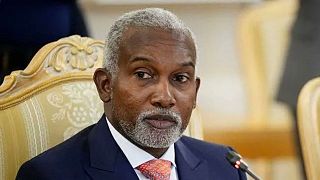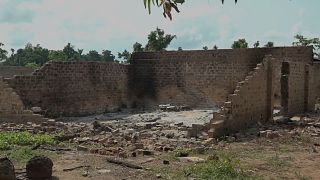Nigeria
“Bama is no more,” says Mustapha Mallam, who, like tens of thousands of other inhabitants, lost everything the day he abandoned his house two years ago as he was forced to flee following persistent attacks by Boko Haram.
Bama, which is the second agglomeration of the State of Borno with nearly 270,000 inhabitants, has become the symbol of the large-scale destruction orchestrated by the Islamist group.
Up to 85% of the town has been destroyed.
Not a house seems to have resisted the outbreak of violence and except the soldiers and workers seen trying to rehabilitate the main artery, no one has returned to Bama.
The Nigerian Islamic group Boko Haram “burned everything” before being chased by the Nigerian army in March. The soldiers found the streets strewn with corpses.
Teacher Mustapha Mallam found “only ashes” when he returned for the first time to his neighborhood which once was “peaceful”, punctuated by the joyful cries of his seven children who “were playing in the yard”.
“There is not even a piece of scrap … What they (Boko Haram) did not carry they burned,” he notes sadly.
What was once a mosque is no more recognizable than its green minaret surmounted by the symbol of the star and the crescent. The roof went up in smoke, the blackened walls still bear the bullet holes.
The general hospital, which is in ruins, is now a playground for the children of the camp of displaced people on the edge of the city where some 10,000 people live. The others found refuge 70 km to the west, of the capital Maiduguri, where a million other people are living.
At the height of its power, the militants had seized territory as large as Belgium after they Nigerian army fled in the face of the onslaught.
For seven months, Bama was “hell on earth”. “One day they gathered boys over the age of 18 in the city prison and executed them,” recalled Ali Mbusube, a former student and now head of the IDP camp.
“There was nothing to eat, there was no school or hospital, and if you stole food they would cut your hand.”
In March, the World Bank estimated the cost of destruction in Borno state, the most affected by the Islamist insurrection, at $ 5.9 billion.
Nearly one million homes were destroyed, about 30% of the total. More than 500 primary schools, nearly 40 colleges, as well as 200 hospitals, clinics and medical clinics experienced the same fate.
As for the water and electricity installations, the damage “is too numerous to be mentioned”, says the governor of Borno, Kashim Shettima.
Reconstruction began two months ago in Bama and Konduga, another city ravaged by fighting, but the task is immense and will take time.
“Much remains to be done and all communities are begging us to help them,” said Shettima, who has however set the ambitious goal of sending a large number of displaced people back home by May 2017.
But in Bama, security remains a major challenge for the heavily armed soldiers who squat the city and protect every major crossroads, behind checkpoints surrounded by concrete blocks and sandbags.
Boko Haram is gone, but many fighters are entrenched in the forest of Sambisa, some thirty kilometers away, from where they routinely make incursions into Bama to steal supplies and equipment.
Corrugated iron plates deliberately obstruct the dirt roads in the outlying suburbs: as insurgents generally attack in the dark, the rustling of sheet metal in their passage is an alarm signal for the military, explains one of them.
The army, which keeps watch of dozens of IDP camps regularly targeted by suicide attacks in the region, is extremely vigilant of new arrivals, often suspected of complicity or belonging to Boko Haram.
Mohamed Mustapha, 70, was locked up for 28 days in the prison of Bama before being released by the authorities, after neighbors identified him.
“The soldiers also scan the palms of the hands of young men,” he says. “There are always traces visible when you are used to holding a Kalashnikov, that’s how they unmask the guilty.”













Go to video
U.S. slashes visa duration for some African nationals amid policy shift
02:05
WAFCON: Super Falcons fans optimistic about the team's performance
01:06
Brazil launches major security operation ahead of BRICS Summit
01:30
Nigerian singer Tems launches Leading Vibe Initiative to support women in music
00:52
Nigeria’s Peter Obi to contest 2027 election, opposition coalition in jeopardy
11:15
AI drones lead breakthrough against malaria in Africa [Business Africa]